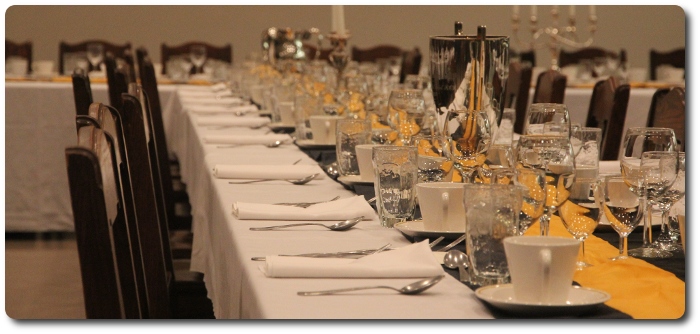Topic: Officers

A modern mess table laid for formal dining an an Officers' Mess.
An Officers' Mess
Dinner in a Dug-Out
The Glasgow Herald, 25 June 1915
The Press Association's special correspondent at British Headquarters in France sends the following despatch, dated June 22:—
The ingenuity displayed in making the dugout that served for the officers' mess as comfortable and home-like as possible was remarkable. The apartment was comparatively roomy and some six feet high. The window boasted an uncracked pane of glass, before which stood a table covered with the latest papers and bearing a jug of wild flowers gathered from the fields behind. In one corner stood a well-made bookcase, constructed from a packing case, filled with novels. The dining table in the centre was amply sufficient for eight of us who sat down to dinner, which was served by two orderlies. Though the dinner service was somewhat of a rough nature, the food was of the best. Soup was followed by chops, with beans and potatoes, while tinned fruit and cream were succeeded by coffee and some excellent Benedictine. The company was of a most varied description. The chaplain was seated next to the medical officer, while the commanding officer of the battalion was engaged in earnest conversation with the machine-gun officer, a keen-faced young soldier with the eternal eye-glass. They were discussing new schemes for worrying the enemy, the main object of those in the trenches when there is a lull in the actual fighting.
Dinner over, we went for a stroll round the lines. The moon had risen by this time, and by its clear light everything could be seen with great clearness. The sentries were still at the parapet, ever on the watch for a human target, while a dozen rifles with gleaming bayonets, rounds of ammunition lying beside each, stood leaning against the parapet, ready to be grasped at an instant's notice by the men resting in their dug-outs. The far-away splutter of a machine gun somewhere down the line showed that some movement in the enemy's line had been detected, or perhaps it was some German working party that had been discovered digging a saphead under the cover of darkness. At the back of the trenches stood some shattered cottages and farmhouses, the moonlight making strange shadows through the gaping holes and jagged crevices in the masonry. In one corner we came across a large pool, the result of a heavy German shell some weeks ago, Occasionally during our round a flare rocket was sent up from the German trench. For a minute or so the whole area between the trenches was brilliantly lit up—the tangle of grass and weeds, the few dead bodies lying out in the open, the long stretch of the enemy's parapet—then the flare fell and burnt itself out in the grass.
